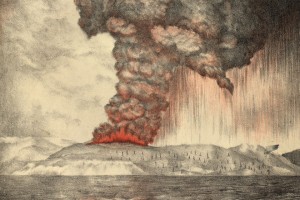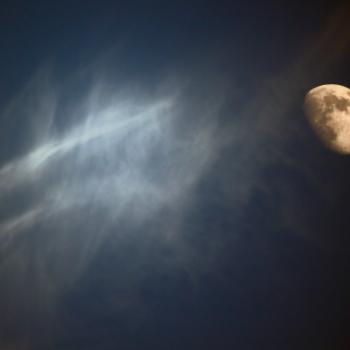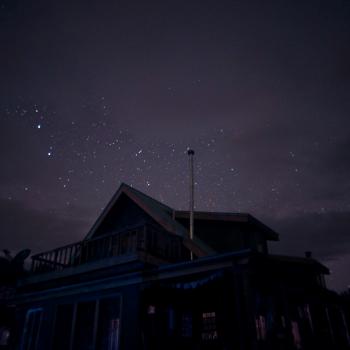
On August 26, 1883, the people of Perth, Western Australia, paused to register what historians have referred to as “the loudest sound ever heard.” Almost 2,000 miles away, a volcanic eruption on the Indonesian island of Krakatoa rocked the world, obliterating two-thirds of the island, and causing tsunamis that killed over 36,000 people.
In 2012, atmospheric alternative rockers The Choir titled their fourteenth record The Loudest Sound Ever Heard, too—a decidedly ironic move for the Nashville, Tennessee-based outfit. The band has made unassuming, understated alternative-rock for almost thirty years, after all, relying more often on restraint than bombast.
It was for this reason, in fact, that I dismissed the band’s music as a teenager in the early nineties. When compared to the heaviness of sludgy Seattle grunge—a sound that stole my heart and never returned it—The Choir felt like a featherweight act to me. Frontman Derri Daugherty’s vocals had all the innocence of a songbird’s, and I preferred Kurt Cobain’s world-weary wail.
A classmate insisted on introducing me to Nirvana’s Nevermind album on his Walkman on a youth group ski trip, and I had obliged him, albeit reluctantly. For my teenage mind, the sacred and the profane existed in compartmentalized, cordoned-off spaces—seldom overlapping and, more often than not, existing at odds with one another.
Nirvana’s music was the loudest sound I had ever heard—or at least the most infectious. While my ears could hardly deny the divinity of Nevermind, I listened exclusively to Christian music at the time and could not add it to my record collection in good conscience. After that ski trip then, I began to search for a Christian equivalent.
I eventually encountered the music of The Choir, which seemed exceptionally tame to me—safe, for lack of a better word. In addition to my objections to Derri Daugherty’s vocals, I was philosophically opposed to the presence of saxophones in rock music. Since Choir saxophonist Dan Michaels also played the lyricon, however—a decidedly cool, electronic woodwind instrument—I found myself conflicted. In the end though, the band slipped from my memory—its gossamer sounds too wispy for me to grasp.
The Choir reappeared on my radar when NoiseTrade.com offered three of the band’s albums for free in 2012 in conjunction with the release of The Loudest Sound Ever Heard. I downloaded each record, including 2005’s O How the Mighty Have Fallen, which is still available on the site. After listening to them and realizing my tastes had changed, I bought the bulk of The Choir’s back catalog, as well as the new album.
As I began to digest The Loudest Sound Ever Heard, I found myself reading and rereading the opening stanza of the second song on the album, “Learning To Fly.” “I’m gonna’ separate / the green glass from the clear / and try to be more responsible / so glad to be here,” writes drummer, lyricist, and co-producer Steve Hindalong. He then segues into something seemingly unrelated: “Forty thousand Indonesians / fathers, mothers, children died / when Krakatoa blew sky high.”
What initially seemed like a jarring juxtaposition—the quiet everydayness of recycling and the earsplitting volume of a natural disaster—began to feel familiar. When faced with the fleeting, fragile nature of life and my own finite abilities and resources to help those who suffer on other continents, I focus not on what I cannot do, but on what I can do. Like the protagonist of “Learning to Fly,” I recycle. When I hear of the Syrian government turning chemical weapons against its own people, I pray.
In life we carry out measured, mundane acts of goodness while senseless acts of nature—or sinister acts of human nature—inflict measureless pain. The opening stanza of “Learning to Fly” challenges me not to underestimate the importance of these everyday acts of goodness. Unspeakable tragedy may perforate eardrums, but it cannot strip our silent, loving gestures of their significance. In the same way, the deafening volume of a bomb blast in Tripoli cannot rob the bird’s song of its beauty.
This is what The Choir’s music is: a songbird making beautiful music in wartime, or in the midst of a natural disaster like the eruption at Krakatoa. Derri Daugherty’s voice insists that the beauty of creation, and God’s love with it, persist even in suffering. Ultimately, The Choir challenges me to attend to the beauty around me, and to think of it not as an exception to the rule, but as a living potential that might be cultivated in the hearts of enemies and friends alike.
I was deaf to all of this in high school, for reasons I understand better now. I suppose I needed the noise of a band like Nirvana because it validated the teenage turmoil within me. In my adult life, the noise is external as much as it is internal: I read of possible military action against Syria, and I need The Choir to sow silence in my soul. I need quiet to drown out the noise.
Which brings me to something of a mystery: In the eighth song on The Loudest Sound Ever Heard, “Melodious,” Daugherty sings, “Dark days, regretful words / threaten joy, but the beat / of a true friend’s heart is / the loudest sound ever heard.” Somehow the beat of a true friend’s heart surpasses the sound of Krakatoa. The true friend of the song is none other than Choir bassist Tim Chandler. This is the world according to The Choir, if only we have the ears to hear as Daugherty, Michaels, Chandler, and Hindalong do.
In closing, there is another story The Choir does not tell: Decades after two-thirds of Krakatoa disappeared underwater, a new volcanic island—Anak Krakatau, or “Child of Krakatoa”—arose from the caldera that formed as a result. Just as the years have not silenced The Choir, neither can they quiet Krakatoa once and for all.
The Choir is offering Good Letters readers a free download of “Learning to Fly” via SoundCloud.
Thank the band by following The Choir on Twitter at @thechoirtweet. Be sure to visit www.thechoir.net for information about the band’s upcoming “New Studio and Live Concert Album Kickstarter Plus Live Concert Kick-Off Show.”
Chad Thomas Johnston is a slayer of word dragons who resides in Lawrence, Kansas, with his wife Rebekah, their daughter Evangeline, and five felines. He is a regular contributor to IMAGE Journal’s “Good Letters” blog at Patheos.com. His writings have also appeared in The Baylor Lariat and at CollapseBoard.com, home to ex-Melody Maker critic/Nirvana-biographer Everett True. In May of 2013, eLectio Publishing released Johnston’s writing debut, a whimsical memoir titled Nightmarriage.











